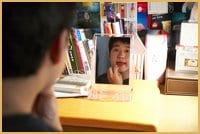
Credit: Out On Screen
Oh Dong-gu, a chubby teenage boy in a dress, slumps on the curb in front of a storefront. His face is bruised and bloodied.
The press of a South Korean crowd envelops him. He is alone: his would-be lover rejected him, his alcoholic father beat him and the maleness of his body betrayed him.
Then a shimmering image of Madonna, saviour of lonely genderqueers everywhere, appears before him.
This is the scene that leads directors Lee Hae-Jun and Lee Hae Young’s transgender masterpiece, Like a Virgin, out of defeat and into the film’s climactic third act.
And no, we’re not talking Madonna the mother of Christ. We’re talking Madonna the sacred bearer of hyper-femininity. Madonna the cis-gendered drag queen. Madonna the queer icon. That Madonna.
The Queen of Pop may seem an expected choice in a transsexual yarn, except that nothing in Like A Virgin is expected. This visually delightful South Korean film puts a spin on North American pop culture influences with a quirky Asian comedic sensibility and a shockingly direct look at transphobic violence.
More than anything, it supplies the most delectable premise to a queer film since But I’m a Cheerleader.
Determined to earn the five million won required for sex reassignment surgery, Oh Dong-gu (Deok-Hwan Ryu) finds himself faced with this curious proposition: to become a woman, first he must be a man.
After an intimate peak at Dong-gu singing off-key to Madonna tapes, the film begins with a sunrise scene at the docks. While Dong-gu’s schoolboy peers are no doubt sleeping in or adjusting their ties, he is schlepping around enormous bags of rice. And he’s good at it.
“Do you know how heavy that is?” his foreman demands, upon seeing him loaded up. “See how many sacks others carry? You’re gonna hurt yourself, kid.”
Ironically, at school Dong-gu endures jeers as the resident sissy boy. Little do his fellow students realize that their girly target is capable of hoisting them over his head like so many bags of grain.
When Dong-gu’s job fails to provide sufficient cash for his surgery, he turns to an even more macho option: ssireum wrestling. A traditional Korean sport, ssireum is similar to Japanese sumo in that victory is achieved by bringing one’s opponent to the ground.
Thrown into the homoerotic world of combat sport, Dong-gu sweats and toils in pursuit of prize money. Every manly grunt and tightly gripped ssatba (a knotted belt representing a man’s balls) brings him closer to womanhood.
It is this seemingly incongruous blending of masculine and feminine elements that makes Like
A Virgin a truly intelligent trans tale. Dong-gu wears his balls proudly in the form of a knot around his thigh, yet does so with the dream of becoming a woman.
Like A Virgin is no Korean TransAmerica, reinforcing masculine/feminine binaries and gendered stereotypes. It’s a genuinely smart film about gender which seeks to dismantle the notion of the man/woman dichotomy at its root.
Following on the heels of a number of other bright queer Korean films (2004’s A Crimson Mark, 2005’s The King and the Clown, 2006’s No Regret), Like a Virgin appears to be part of a growing movement. Lee Hae-Jun and Lee Hae Young have found the recipe for great transgender film: take a number of steps away from the Hollywood mainstream, create an incongruous mix of cultural elements (Madonna, ssireum), add a dash of directness and a double helping of humour, boil off all binaries and dichotomies, then stir, bake and serve with a twist.
It’s a dish worth trying. Twice.

 Why you can trust Xtra
Why you can trust Xtra


